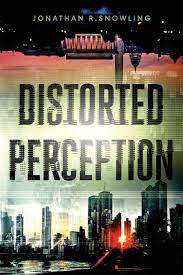Distorted Perception received a 4+ star review, making it an IndieReader Approved title.
Following find an interview with author Jonathan R. Snowling.
What is the name of the book and when was it published?
Distorted Perception was published on June 21st
What’s the book’s first line?
“The rusted security door squeaked as it jammed partway open. Edgardo Blades leaned into it with his shoulder and pushed until it swung the rest of the way, banging hard against the cinder block wall.”
What’s the book about? Give us the “pitch”
Distorted Perception is a political thriller in the vein of Tom Clancy and George Orwell. It’s an action packed roller coaster read with a heavyweight intellectual punch. The story’s themes center on the omnipresence of propaganda, the value of truth, and the illusory nature of power
What inspired you to write the book?
Out of the blue one afternoon, during a meeting with a Central American presidential campaign in the midst of an intense riot, a security guard handed me a laptop case that I had left at my office across town. The campaign had been operating under constant threats of assassinations, so the oddity of that moment inspired a slight burst of paranoia in my mind. At first I simply thanked him and placed the laptop case down in a side room alongside the personal items left by the other attendees. A few minutes later I starting wondering how it was that this security guard, whom I had never met, knew that I had left my laptop back at my office in the first place. I had not mentioned that I left it to anyone. Then I thought, what if it’s a bomb? I jetted back into the other room to search for it. As I did, my brain raced through a million different possible conspiracy theories of what could have led to that moment. When I finally opened the case, all I found was my wonderful computer inside. As it turns out the security guard was just a really nice guy. He had noticed the laptop case lying on my desk and thought I would want it. The concepts produced in that heightened state of mind though were pretty wild. It was great source material.
What’s the main reason someone should really read this book?
Entertaining, intelligent and realistic. The great plot and characters keep you turning the pages as fast as you can, but it’s also a very deep book. Distorted Perception offers a great deal of wisdom and insight into the operations of world leaders and the systems that we live our lives under.
What’s the most distinctive thing about the main character?
A campaign manager with a conscious.
Who-real or fictional-would you say the character reminds you of?
Rex Nash is one of kind.
When did you first decide to become an author?
I’ve always loved being a story teller ever since I was a kid, but I would never have imagined going the route of becoming an author. My careers in public relations and politics all involved story telling in their own way, but I had hoped to somehow maneuver my way into creating films one day. In fact, Distorted Perception started out as a screenplay. At some point I realized that this story would be best served in the format of a book. That’s how my novel writing adventure began.
Is this the first book you’ve written?
First full length novel.
What do you do for work when you’re not writing?
Filmmaker and political consultant
How much time do you generally spend on your writing?
Too much.
What’s the best and the hardest part of being an indie?
The best part is that without the chains and constraints of moneyed interests your creations are fueled by a love of the story and the art alone.
The worst part is that without the chains and constraints of moneyed interests your creations are fueled by a love of the story and the art alone.
What’s a great piece of advice that you can share with fellow indie authors?
Write primarily to satisfy a reader of one, yourself. If other people don’t like your art, you can always tell them to go take a hike. Above all though, strive to be an individual of good taste.
Would you go traditional if a publisher came calling? If so, why?
Judging from the absolute and total crap that litters the shelves of most major bookstores these days, it’s doubtful that our tastes in literature or storytelling will ever align. My worst nightmare would be to see my novel placed alongside the latest pool of vomit that some CNN or FOX News host puked onto paper.
Is there something in particular that motivates you (fame? fortune?)
A love of good stories.
Which writer, living or dead, do you most admire?
I admire the works of Hunter S. Thompson and Ernest Hemingway though I don’t admire these authors on personal level. Every individual is different, but by and large addicts are one of my least favorite classes of people.
I also admire the boldness of early Ayn Rand. I think she took some big swings with the Fountain Head. Even if the conclusions and end results were a number of foul balls, I have always admired her tenacity and willingness to jump in head first to tackle the big ideas.
Which book do you wish you could have written?
1984 by George Orwell.

